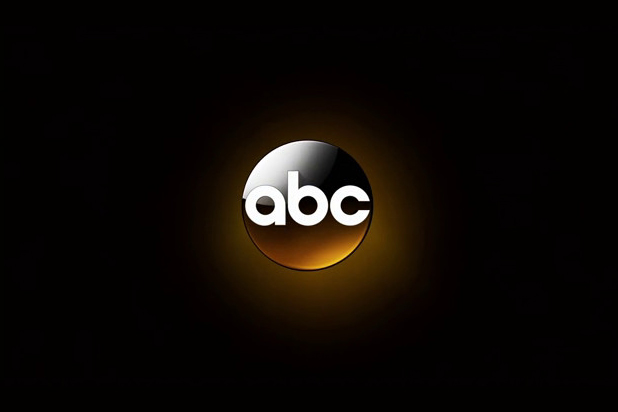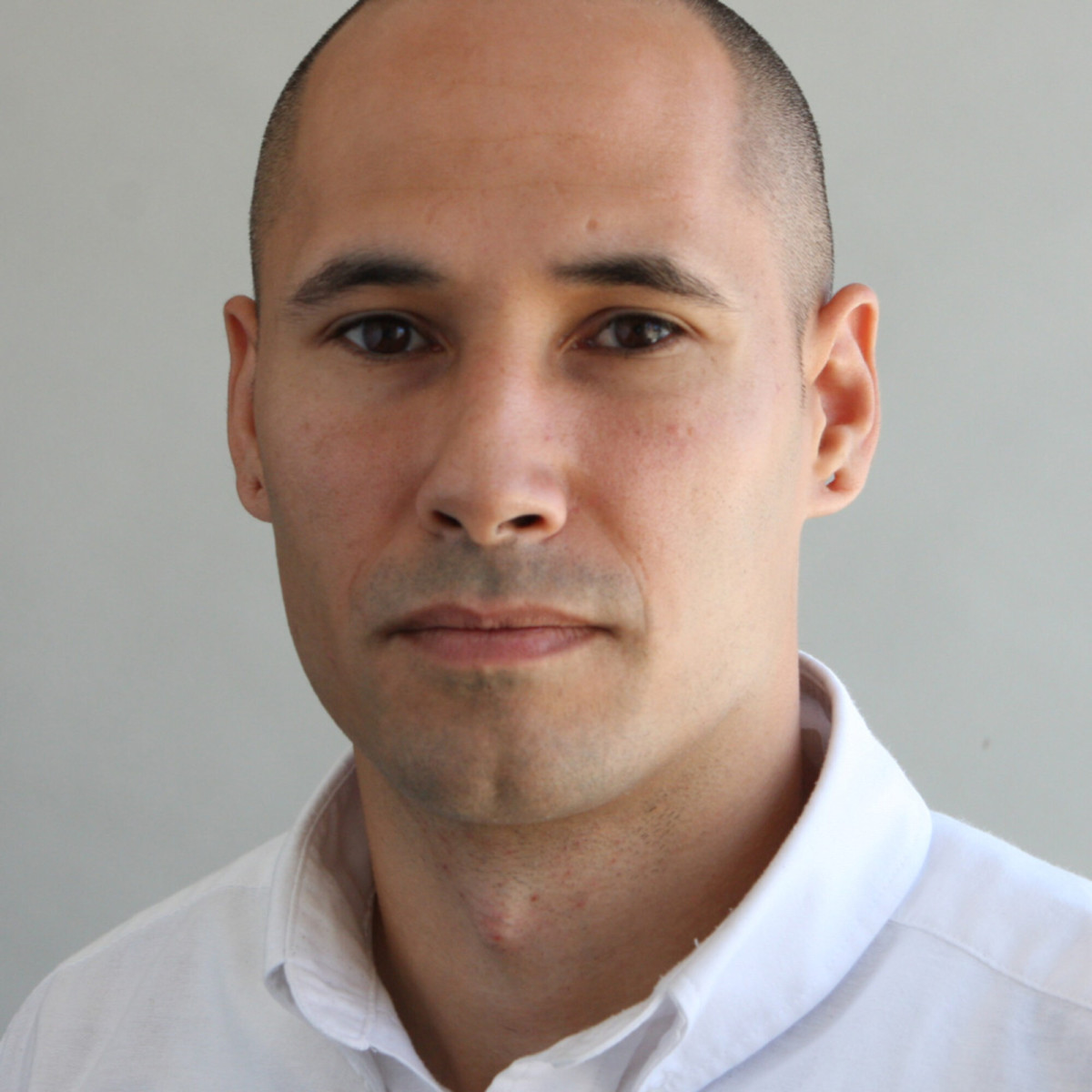‘Racially Insensitive Comments’ in Fact Made
Support Journal-isms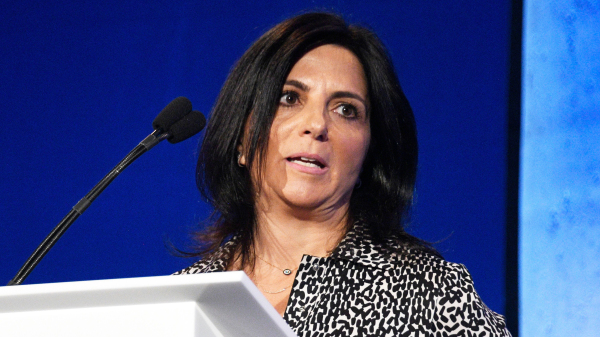
‘Racially Insensitive Comments’ in Fact Made
“ABC News executive Barbara Fedida will not return to the Disney-owned unit following an investigation into allegations of insensitive behavior and her treatment of employees, according to a person familiar with the matter,” Brian Steinberg reported late Monday for Variety.
“Staffers were notified of the matter Monday in a memo from Peter Rice, chairman of Walt Disney Television. ‘The investigation substantiated that Ms. Fedida did make some of the unacceptable racially insensitive comments attributed to her. It also substantiated that Ms. Fedida managed in a rough manner and, on occasion, used crass and inappropriate language,’ Rice said.
“ ‘Lastly, the investigation found no basis for the claims that Ms. Fedida was the subject of dozens of HR complaints and that ABC News spent millions of dollars in confidential settlements related to Ms. Fedida, as alleged in some press accounts.’ . . . ”
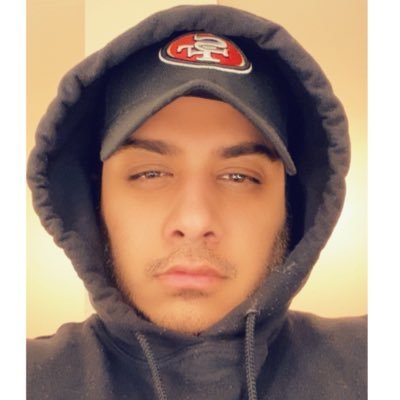 When Yashar Ali (pictured) reported the allegations against Fedida June 13 for HuffPost, the National Association of Black Journalists said in a statement, “This external investigation by ABC News should be transparent, and all findings must be published and broadcast. This is appropriate because Fedida was no second-tier executive.
When Yashar Ali (pictured) reported the allegations against Fedida June 13 for HuffPost, the National Association of Black Journalists said in a statement, “This external investigation by ABC News should be transparent, and all findings must be published and broadcast. This is appropriate because Fedida was no second-tier executive.
“This top ABC News executive wielded arguably the most power at the network in determining the fates of Black employees in terms of hiring and contracts. The careers of many at ABC News, as well as their future advancement, was literally in her hands.
- ” We demand that there be immediate redress for those who have been wronged
- ” We want an African American to be put in charge of the network’s diversity-in-hiring program
- ” ABC News/Disney must hire an outside consultant to assess the culture, work environment and policies at ABC News. . . .”
As The Wrap summarized then, “These complaints include an instance during contentious contract negotiations where a staffer said they witnessed Fedida tell ‘Good Morning America’ co-anchor Robin Roberts that the network wasn’t asking Roberts to ‘pick cotton,’ in response to Roberts’ request for more money when the contract renewed.
“Another complaint from an anonymous staffer said that in speaking about black former ABC news anchor Kendis Gibson, ‘ABC “spends more on toilet paper than we ever would on him.” ‘”
- National Association of Black Journalists: NABJ Statement on ABC’s Firing of Barbara Fedida
Black Fox Staffers Call Out Company
Top Brass Hear About ‘Rampant Racism’
Lewis’ Life Passion, Voting Rights, Set Back
L.A. Times Discourages Use of ‘Looting’
‘Negro’ Demoted to ‘Racial Slur’ in News Reports
Covering Protests Is ‘Ever More Dangerous’:
. . . ‘A Press Badge Should Not Be a Bullseye’
. . . Police Want to Withhold Body Cam Footage
. . . Cops Hadn’t Heard of Boston’s Black-Owned Paper
Creating a New Generation of the Black Press
Diversity Jobs Fell Before George Floyd Protests
Latinos Driving U.S. Population Growth
2020 Could Be Banner Year for Native People
2 Black Women to Help Reshape Publishing
Neo-Nazi Admits Targeting Journalists
4 Win International Press Freedom Awards
Journal-isms Fund Drive Continues
Short Takes
Fox Business host Charles Payne, who has been at Fox since 2007, lamented the network’s tone when covering Black cultural stories, including the killing of California rapper and anti-gang activist Nipsey Hussle. (video)
Top Brass Hear About ‘Rampant Racism’
“Four days after Fox News aired a particularly tone-deaf graphic connecting the killings of Black men — including George Floyd and Martin Luther King Jr. — to stock market gains, many of the network’s Black staffers took part in a phone call with company brass to confront Fox’s increasingly racist and hostile rhetoric towards the protests against police brutality,” Lachlan Cartwright, Lloyd Grove, Andrew Kirell, Noah Shachtman and Justin Baragona reported Friday, updated Saturday, for the Daily Beast.
“It did not go well.
 “The call on June 9 lasted more than 90 minutes and included Fox News Media CEO Suzanne Scott, President Jay Wallace, and HR chief Kevin Lord, people familiar with the matter told The Daily Beast. It was led by Scott, who is white, and Marsheila J. Hayes (pictured), the vice president of diversity and inclusion at Fox Corporation, who is Black.
“The call on June 9 lasted more than 90 minutes and included Fox News Media CEO Suzanne Scott, President Jay Wallace, and HR chief Kevin Lord, people familiar with the matter told The Daily Beast. It was led by Scott, who is white, and Marsheila J. Hayes (pictured), the vice president of diversity and inclusion at Fox Corporation, who is Black.
“It was almost immediately rife with tension. One staffer directly asked why Bret Baier — the anchor of the network’s key weekday news broadcast, Special Report, which aired the offensive graphic — was not on the call, nor any other white on-air talent. (Baier had previously apologized for the ‘major screw-up,’ noting that, because the show bears his name, ‘the buck stops with me.’ Fox News also apologized for the ‘insensitivity’ of the infographic, adding that it ‘should have never aired on television without full context.’)
“Other participants on the call expressed anger and distress about rampant racism at Fox, both on- and off-air.
“Fox Business Network host Charles Payne, who is Black, was particularly incensed, according to multiple people who attended the call. In fact, he had previously called Scott directly and, per a person familiar, was ‘ripshit’ about the Baier graphic debacle and about racist remarks that Laura Ingraham had recently made on the air.
“At one point on the June 9 call, sources told The Daily Beast, an irate Payne suggested he’d been the victim of racial discrimination, repeatedly passed over for opportunities given instead to white colleagues. Elsewhere, the staffers recalled, Payne, who has been at Fox since 2007, lamented the network’s tone when covering Black cultural stories, including the killing of California rapper and anti-gang activist Nipsey Hussle. How can he talk to his children about Fox News, the host wondered, when it portrays people like Hussle in a racist, stereotypical manner as a gangster? . . .”
- Robin Abcarian, Los Angeles Times: Did Tucker Carlson apologize for his head writer’s racist, sexist and homophobic posts? Of course not
- Jon Allsop, Columbia Journalism Review: What John Lewis can teach the press
- David Bauder, Associated Press: Fox’s Harris Faulkner is used to people making presumptions
- Max Boot, Washington Post: The GOP’s future looks more like Tucker Carlson than Larry Hogan
- Bob Brigham, Raw Story: MSNBC anchor goes after Fox News for Tucker Carlson ‘dabbling’ in white supremacy
- Lou Dobbs, Twitter: We would like to acknowledge mistakes that were made during last night’s broadcast. . . .
- KJ Edelman, Mediaite: CNN Hosts Shocked By Tucker Carlson’s ‘Sham’ Apology For Writer’s Racism: ‘Vile Content’ Bled Into His Show
- Jeet Heer, The Nation: Why Do All These Racists Keep Working for Tucker Carlson?
- Nikki McCann Ramirez, Media Matters for America: Tucker Carlson’s racist and extreme descriptions of the Black Lives Matter movement
- Giovanni Russonello, New York Times: Some Republicans Have Grown Wary of Protests Against Racism, Poll Shows (July 8)
- Erik Wemple, Washington Post: Tucker Carlson whitewashes the racism of his show and his former top writer
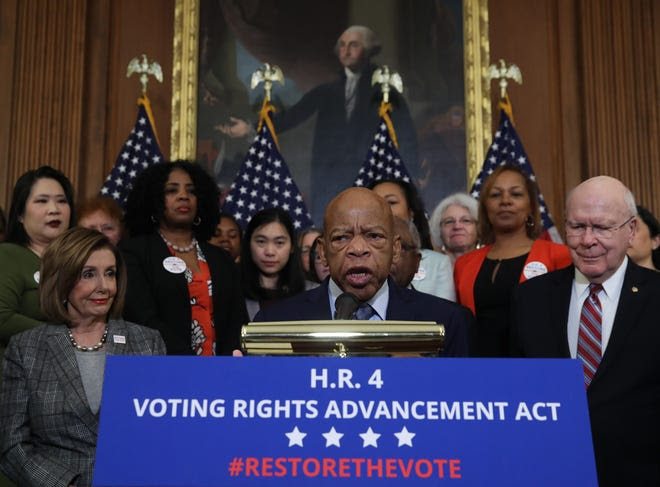
Lewis’ Life Passion, Voting Rights, Set Back
The late Rep. John Lewis, who will forever be remembered for his participation in the 1965 voting-rights march from Selma to Montgomery, Ala., died Friday as the Supreme Court was moving in the opposite direction, Adam Liptak reported Saturday for the New York Times.
“For the fourth time since April, the Supreme Court this week made it harder for Americans to vote,” Liptak wrote. “The ruling, Justice Sonia Sotomayor wrote in dissent, was part of ‘a trend of condoning disfranchisement.’
“The court’s rulings — in cases from Alabama, Florida, Texas and Wisconsin — provide a contrast to an image of the court that emerged at the end of the term that ended last week, one in which liberals achieved some significant victories. The recent run of election cases tell a different story.
“ ‘One might have thought that the crisis in voting created by the pandemic would have caused the justices to rise above their usual ideological and partisan divide on election questions,’ said Richard L. Hasen, a law professor at the University of California, Irvine. ‘But there’s no sign of that on the horizon.’ . . .”
Liptak also wrote, “But the bottom line was uniform: The Supreme Court, which is dominated by five Republican appointees, sided with arguments pressed by Republicans to restrict voting rights in every case. . . .”
On CNN’s “State of the Union” Sunday, host Jake Tapper asked Rep. James Clyburn, D-S.C., friend of Lewis’ since 1960, how President Trump could honor Lewis.
As Vox explained in 2019, “That ruling . . . invalidated a key portion of the Voting Rights Act of 1965, long seen as one of the most important civil rights laws of the past century. On June 25, 2013, the court’s conservative majority ruled that the government was using an outdated and unconstitutional process to determine which states were required to have their voting rules approved by the government. Before the ruling, nine states (and several other counties and townships) had been subjected to this requirement. . . .
“The ruling had an impact that continues today, with several civil rights and voting rights groups telling Vox that the post-Shelby era has presented various difficulties: an uptick in legal actions taken against states, increased costs for monitoring and pursuing litigation over voting restrictions, and, perhaps most significantly, more laws creating new requirements in the voting process — many of them disproportionately affecting black voters and other communities of color. . . .”
Clyburn continued, “The Supreme Court gutted the 1965 Voting Rights Act. And it said in that decision that these are some things you can do to reauthorize this act. The House of Representatives has passed that.
“I think that Trump and, in the Senate leadership, Mitch McConnell, by their deeds, if they so celebrate the heroism of this man, then let’s go to work and pass that bill, because it’s laid out the way the Supreme Court asked us to lay it out.
“And if the president were to sign that, then I think that’s what we would do to honor John. It should be the John R. Lewis Voting Rights Act of 2020. That’s the way to do it.
“Words may be powerful, but deeds are lasting.”
- Jon Allsop, Columbia Journalism Review: What John Lewis can teach the press
- Joel Anderson, Slate: Do Not Call John Lewis a “Hero” if You Stood in His Way
- Joshua Bote, USA Today: John Lewis was 23 at the March on Washington. His life in service to justice, in 12 images.
- Michael A. Fletcher, The Undefeated: I didn’t understand John Lewis at first
- Aaron Morrison, Associated Press: How the Black Lives Matter generation remembers John Lewis
- Michele L. Norris, Washington Post: A civil rights giant passes the baton
- Kevin Powell, The Guardian: To John Lewis, with love
- Jennifer Rubin, Washington Post: Even in his passing, John Lewis taught us a lesson
- Adam Serwer, The Atlantic: John Lewis Was an American Founder
- SNCC Legacy Project: Claiming John Lewis [PDF]
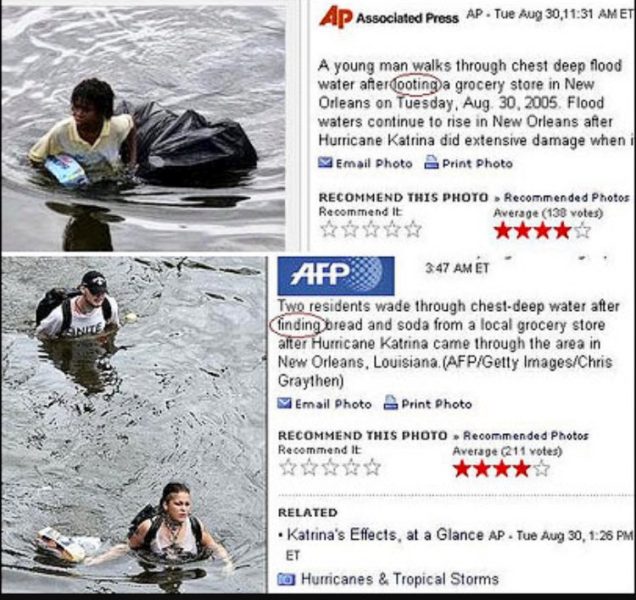
L.A. Times Discourages Use of ‘Looting’
At the urging of the newsroom’s Black Caucus, the Los Angeles Times is discouraging the use of “looting” and “looters” in its news stories.
Its standards and practices committee updated its guidance regarding use of “looting” on July 2.
The new style entry reads:
“ ‘Looting’ is a crime that occurs only during a state of emergency (in any jurisdiction: state, county, city, etc.). Do not use it as a broad label or term for protest, burglary, theft or chaos. Because of the racial connotation and history of the word, use terms like ‘looting’ or ‘looters’ only in the context of criminal proceedings.
“Unless a story is specifically about looting or those charged with the crime, ‘looting’ or its derivations (‘looted,’ ‘looters’) should not be used in the story, display type (headline, captions, pull quotes, etc.), SEO type and headlines, story description, URL, social sharelines, tweets or Facebook posts.
“If in doubt about whether to use ‘looting,’ talk to your immediate supervisor. There may be exceptions to this guidance, and any deviation requires a managing editor’s approval.
“When writing or talking about the actions of people in stories and visuals (photos, videos, etc.), it is best to describe what they specifically appear to be doing. Examples: 1) Some people broke into the store and stole whatever was on the shelves. 2) A group of at least 20 people threw bricks and shattered the windows of an electronics store. One woman quickly emerged with an armful of iPods. 3) Before leaving the disaster area, a man stopped by his local convenience store and, finding no one at the register, took several 12-packs of beer without paying. . . .”
“Other words to use in lieu of ‘looting’ in headlines could include theft, damage, break-ins, vandalism, burglaries. . . .”
Angel Jennings, a leader of the Black Caucus, told Journal-isms by email Sunday that the caucus “appreciates that its concerns were swiftly addressed, particularly the discussion around ‘looting.’ . . .”
Jennings also said, the “backlash over the term ‘looting’ as well as other cultural and editorial decisions at the paper [spawned] The Black Caucus, a sub-arm of our news guild aimed at addressing issues of Black representation at the Los Angeles Times.
“Our first action as a group was a social media campaign called #BlackatLAT, where Black journalists past and present lay bare the treatment we faced at the paper. We published an open letter addressed to the paper’s owner and management that outlined ways that they could right these wrongs — hire more Black journalists, create a pipeline for us to advance, pay us fairly and give us a seat at the table. Here’s a link to that letter.
“The paper’s owner agreed to all of our demands [except] one, which was to end furlough without lay-offs. . . .”
Criticism over applying the term “looting” to actions of African Americans was at a peak during Hurricane Katrina in 2005, when two photos were widely circulated. The caption for one said that a white survivor was “finding” food while another assumed a Black survivor, on the same quest, was “looting” a store — even though the images looked nearly identical.
In fact, as Journal-isms reported at the time, the complaint was more metaphor than fact. The photos were taken by different photographers working for different news services, each with its own standards of what could be called “looting” and what “finding.”
- Evan Gahr, California Globe: Los Angeles Times Deems ‘Looting’ Verboten and Racist
THIS. Read it twice. https://t.co/2ce3uWefM9
— Mr. Mo’Kelly ?️ (@MrMokelly) July 19, 2020
‘Negro’ Demoted to ‘Racial Slur’ in News Reports
The word “Negro,” once a term so respectable that Black scholars such as W.E.B. Du Bois fought a campaign to have the media capitalize it, is now considered a “racial slur,” according to reporting of an encounter Saturday night between Roger Stone, whose prison sentence was recently commuted by President Trump, and radio host Morris O’Kelly.
“Around 12 minutes into the interview, host Morris O’Kelly pressed Stone on how his closeness to Trump influenced his commutation,” Isabel Togoh wrote for Forbes.
“ ‘I do believe that certain people are treated differently in the federal justice system…There are thousands of people treated unfairly daily. Hell, your number just happened to come up in the lottery. I’m guessing it was more than just luck, Roger, right?,’ O’Kelly asked Stone.
“Stone was heard pausing before audibly muttering: ‘I don’t really feel like arguing with this negro,’ to which O’Kelly responded by asking: ‘Roger? I’m sorry, what did you say?’
“Stone stays silent for about 40 seconds, during which the line remained audible, before he sighed and responded: ‘Uhh, you’re back, you there? Hello?’
“Asked again about saying the word ‘negro’, Stone replied: ‘I did not. You’re out of your mind. You’re out of your mind,’ before going on to blame the phone connection.
“Speaking with The New York Times after the interview, O’Kelly said the derogatory term was the ‘diet version of the N-word’ and something that, as a Black man, he comes across ‘pretty frequently’.”
Reports by Forbes and NBC lower-cased the word used by Martin Luther King Jr. in his famous “I Have a Dream” speech but which has since become outdated. Ironically, NBC announced it was capitalizing “Black.”
“The slur that Mr. Stone used was commonly used to refer to Black Americans through part of the 1960s, but for decades it has been considered offensive,” Aimee Ortiz and Marie Fazio wrote for the Times.
A more nuanced explanation might say the offensiveness depends on who is using the word and why.
Andrea Sahouri, a Des Moines Register reporter, discusses her arrest after covering a demonstration protesting the police killing of George Floyd. (video)
Covering Protests Is ‘Ever More Dangerous’
It is “becoming ever more dangerous for reporters to cover legitimate public assemblies where police are sometimes literally gunning for them,” Gary Arlen wrote Friday for the Radio Television Digital News Association.
Arlen also wrote, “The Committee to Protect Journalists tallied nearly 500 incidents in U.S. cities from late May through June where police and/or protesters’ actions affected reporters.
“According to the U.S. Press Freedom Tracker (a joint project of CPJ [Committee to Protect Journalists], the Freedom of the Press Foundation, and other free-press organizations), during the weeks after George Floyd’s death in Minneapolis, there were 112 physical attacks on reporters (67 by law enforcement officers); 64 arrests of reporters and about 200 tear gassings, pepper sprayings and 104 rubber-bullet or projectile strikes. In addition, the report identified nearly 70 incidents of media equipment or newsroom damage. . . .”
Arlen also wrote for RTDNA, “One ongoing challenge is to educate police about press freedom rights. Most local law enforcement officers take an oath to support the U.S. Constitution as well as state constitutions, but their actual training may be limited to about two hours of media training while at the police academy, according to sources I interviewed — hardly enough time to delve into the First Amendment. Supervisors get additional training as they work their way up the ranks, but those constitutional values may lapse in the heat of a confrontation. . . .”
There were these recent developments:
. . . ‘A Press Badge Should Not Be a Bullseye’
In New Jersey, “An Asbury Park Press reporter arrested covering a Black Lives Matter protest in June filed a federal lawsuit Monday claiming the police had violated his First Amendment and other civil rights protections,” Joe Strupp and Mike Davis reported July 13 for the newspaper.
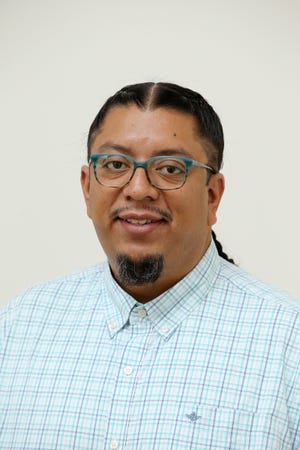 “The lawsuit by Gustavo Martínez Contreras (pictured), 40, filed in federal court, names as defendants the cities of Asbury Park and Belmar, Monmouth County, Asbury Park Police Capt. Amir Bercovicz and 14 unnamed officers. . . .
“The lawsuit by Gustavo Martínez Contreras (pictured), 40, filed in federal court, names as defendants the cities of Asbury Park and Belmar, Monmouth County, Asbury Park Police Capt. Amir Bercovicz and 14 unnamed officers. . . .
” ‘I’m filing this lawsuit because a press badge should not be a bullseye,’ Martinez Contreras said in a statement.
“The action stems from a June 1 protest in Asbury Park over the May 25 death of George Floyd . . . Martínez Contreras covered the protest for the Press, including shooting live video from the scene that aired on social media.
“Despite wearing press credentials and identifying himself as a reporter, Martínez Contreras was violently tackled by police dispersing the crowd at the protest’s chaotic conclusion, detained, transported and jailed for several hours. . . .”
The Reporters Committee for Freedom of the Press said July 13 that its safety tips for reporters covering protests were being misused by the Monmouth County prosecutor’s office. “An investigation into the arrest improperly cited Reporters Committee resources in concluding that the arresting officers did not know they were apprehending a reporter.”
Its findings “only detail practical safety tips for reporters covering protests — not the legal standard for when officers should know someone is a journalist. . . .”
. . . Police Want to Withhold Body Cam Footage
In Des Moines, Iowa, lawyers are arguing over whether police should release body cam footage in the case of Andrea Sahouri, (pictured) a Des Moines Register reporter who was arrested during a protest.
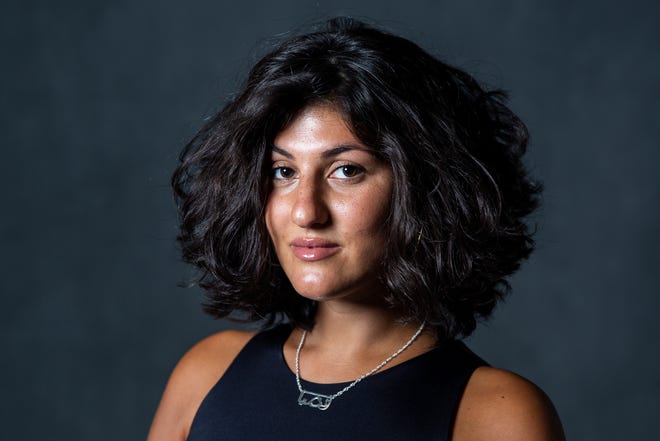 “Sahouri was covering demonstrations after the death of George Floyd on May 31 “when some in the crowd began destroying property and looting nearby stores,” Tyler J. Davis reported Thursday, updated Friday, for the Register.
“Sahouri was covering demonstrations after the death of George Floyd on May 31 “when some in the crowd began destroying property and looting nearby stores,” Tyler J. Davis reported Thursday, updated Friday, for the Register.
“As Des Moines police deployed pepper spray and other nonlethals outside the Target, the crowd began to disperse. Sahouri and boyfriend Spenser Robnett, who accompanied her to the protest because he was worried about her safety, made it as far as the Verizon store parking lot across Douglas Avenue when officers sprayed and detained them. . . .”
”Sahouri, 24, was charged with two misdemeanors: interference with official acts and failure to disperse. . . .”
“Brad Kinkade, an assistant Polk County attorney, argued that his office is too busy and the case is too low-priority to immediately turn over body-camera footage. . . .”
But “Nick Klinefeldt, an attorney for Sahouri, rejected this premise in court, as he did in previous filings, saying if authorities thought it reasonable to arrest and jail Sahouri and give her a criminal record, it should be reasonable that they provide evidence of the crime she committed. . . .”
. . . Cops Hadn’t Heard of Boston’s Black-Owned Paper
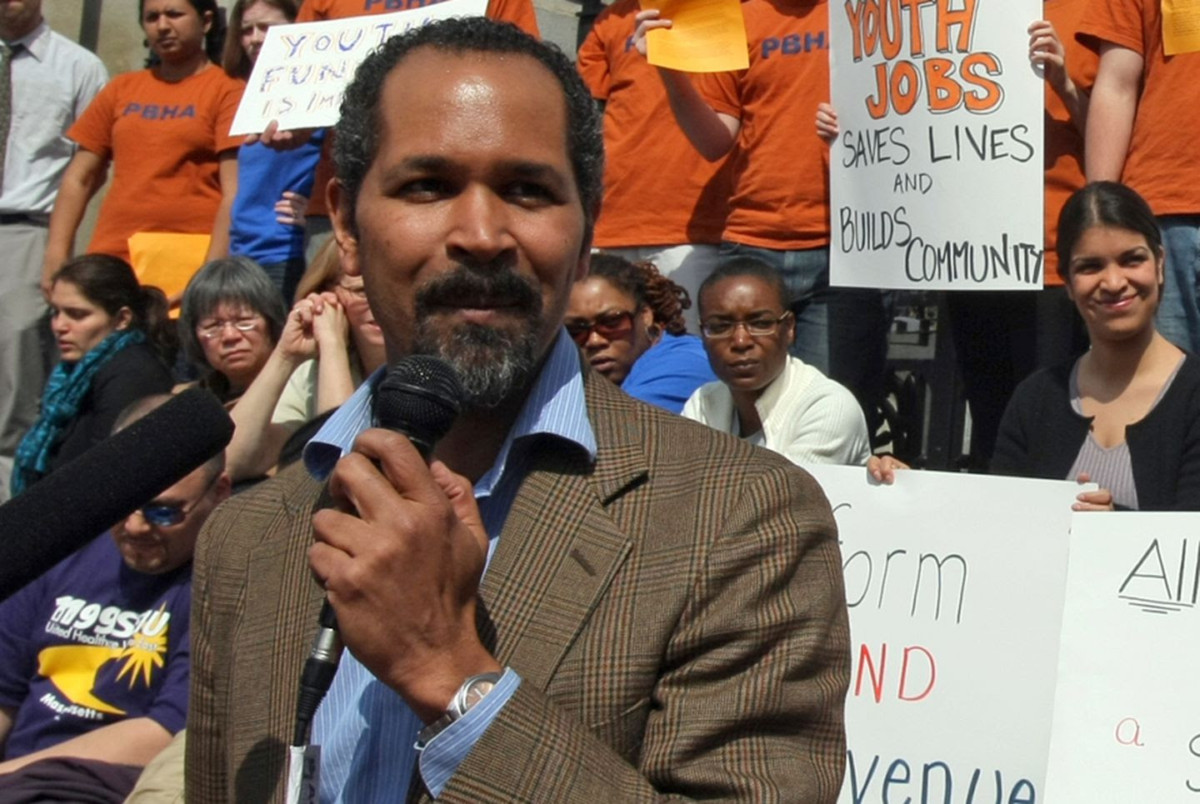 In Boston, meanwhile, “As Bay State Banner Senior Editor Yawu Miller (pictured) left Roxbury Municipal Court Monday, where he had been taking photos on the job, seven Boston police officers stopped him, Miller wrote in a tweet,” Gal Tziperman Lotan reported Tuesday for the Boston Globe.
In Boston, meanwhile, “As Bay State Banner Senior Editor Yawu Miller (pictured) left Roxbury Municipal Court Monday, where he had been taking photos on the job, seven Boston police officers stopped him, Miller wrote in a tweet,” Gal Tziperman Lotan reported Tuesday for the Boston Globe.
“ ‘1st time in more than 20 years! I thought the gray hair disqualified me. Apparently not!’ Miller wrote.
“Miller, like people involved in about 70 percent of police stops, searches, and observations in Boston, is Black.
“ ‘They FIOed me!’ Miller wrote in a tweet, referring to the acronym the city’s police department uses for what it calls Field Interrogations and Observations.
” ‘Black Bostonians make up about 25 percent of the city’s population, but a vast majority of FIOs — a broad description that can apply to stop-and-frisks, searches, or police officers recording observations of someone. The FIO data the department releases is only for stops in which officers did not find evidence of a crime; stops that ended in arrests are not included. . . .
“Miller said the officers told him they stopped him because he was taking photos near the B-2 district station in Nubian Square. He said they did not recognize the name of the Bay State Banner, a Black-owned weekly newspaper that has operated in Boston since 1965. . . .”
- Sam Biddle, The Intercept: Police Surveilled George Floyd Protests With Help From Twitter-Affiliated Startup Dataminr (July 9)
- Kate Bubacz, BuzzFeed News: Here’s Why BLM Protesters Have Asked Journalists Not To Show Their Faces
- Arturo Domínguez, Latino Rebels: Say Their Names: Latino Lives Lost to Police Brutality
- Editorial, New York Times: Why Does the N.Y.P.D. Want to Punish Journalists?
- Asraa Mustufa and David Eads, Chicago Reporter: Chicago Police Department arrest API shutdown is its own kind of ‘cover up’ (July 8)
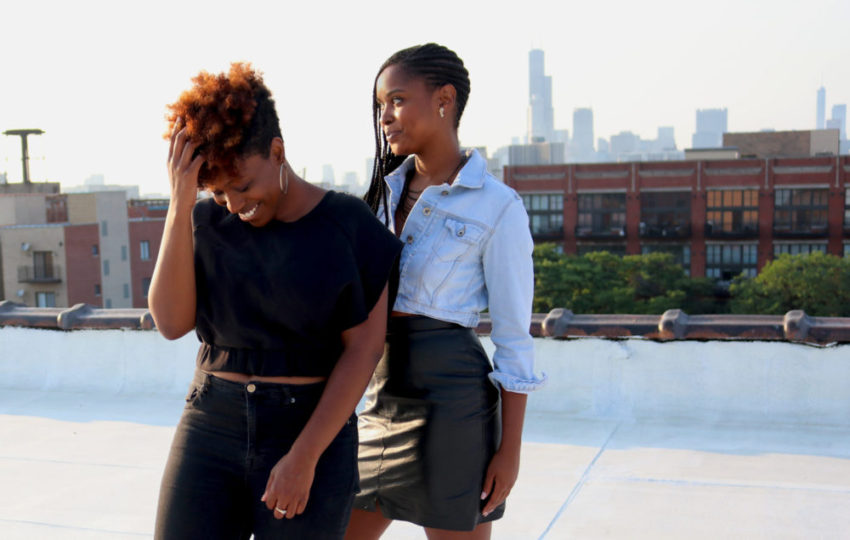
Creating a New Generation of the Black Press
“The new Black press is changing the lenses of victimization and dysfunction into lenses of empowerment and agency,” Deborah Douglas wrote Tuesday for Nieman Reports.
“At least 10 Black legacy outlets have joined the newly launched Fund for Black Journalism — Race Crisis in America, organized through the Local Media Foundation. The campaign aims to raise $2 million to create shared video, data, and investigative reporting projects and provide stipends to help local outlets enhance their reporting on race issues.
“Participating media organizations include New York Amsterdam News, The Atlanta Voice, Houston Defender Network, The Washington Informer, The Dallas Weekly, St. Louis American, Michigan Chronicle, The Afro, Seattle Medium, and The Sacramento Observer. . . .”
The fund is part of a larger trend.
” ‘News and reporting about Black communities, which is what mainstream news offers, is a lower bar than news and reporting for Black communities,” says journalist and researcher Carla Murphy, who is working on a report about the Black news ecosystem for the Center for Community Media at the Craig Newmark Graduate School of Journalism at CUNY.
“Outlets like The TRiiBE; theGrio, a video-centric site devoted to African-American perspectives; ZORA, a publication for women of color hosted on Medium; digital sports and culture site The Undefeated; Coronavirus News for Black Folks, a newsletter focused on the disparate impact of the pandemic on African-Americans; The Root, whose tagline is, ‘The Blacker the Content the Sweeter the Truth’; Outlier Media in Detroit, which leverages text messaging to drive coverage; The Plug, a news and insights platform covering the Black innovation economy; Blavity, a community for Black creativity and news; and networked journalism, which includes citizen journalists as well as trained professionals in the production of news are some of the sites and initiatives targeting Black audiences that have found their sweet spot in providing news, information, and resources for Black communities as national attention has been focused on the coronavirus and the protests” after the police killing of George Floyd in Minneapolis.
- Stacy M. Brown, National Newspaper Publishers Association: Thousands View NNPA’s First Virtual Convention (July 11)
Companies observed Juneteenth as a holiday for the first time last month after nationwide protests calling for racial equality. Here, employees up and down the corporate ladder explain what they hope the day will achieve. (Credit: Wall Street Journal) (video)
Diversity Jobs Fell Before George Floyd Protests
“American companies cut back sharply on hiring for jobs related to diversity and inclusion when the coronavirus pandemic struck in mid-March, with openings falling twice as fast as for other listings, according to data from one of the country’s biggest career sites,” Jena McGregor reported Wednesday for The Washington Post.
“Postings for job titles such as ‘chief diversity officer,’ ‘diversity and inclusion recruiter’ or ‘D&I program manager’ fell nearly 60 percent between early March and early June, according to the careers site Glassdoor, which plans to publish the report Wednesday. That’s a sharper drop than for overall human resources jobs, which fell 49 percent, or job openings overall, which fell 28 percent.
“But as corporate America offered new commitments to work for inclusion amid the national reckoning on racial injustice that erupted after the killing of George Floyd in police custody, the same category of job openings rebounded. D&I postings rose 50 percent in June on Glassdoor, the largest percentage increase over a four-week period since January 2016, though they are still well below their March peak.
“ ‘The fact that D&I job openings fell very quickly is concerning if it indicates companies are more willing to cut back on that function when times get tough,’ said Daniel Zhao, a senior economist at Glassdoor.
“As for the rebound, Zhao said: ‘I think the timing is demonstrative. Because the increase in D&I jobs occurs almost immediately after the protests began, it points to increased pressure both from society and from their employees.’ . . .”
- Hana Baba, KALW-FM, San Francisco: UC Berkeley Journalism’s New Dean Vows Change
- Tyler Falk, Current: Two leaders speak ‘uncomfortable truths’ about race in public radio
- Mark Hemingway, Spectator: Liberal Newsrooms Fail the True Black Lives Matter Test (July 10)
- Jarrett Hill, Self: 9 Black Journalists on What It’s Been Like to Cover — And Cope With — The News
- Caroline Kitchener, The Lily: ‘How many women of color have to cry?’: Top feminist organizations are plagued by racism, 20 former staffers say
- Ricki Morell, Nieman Reports: Reporting and Resilience: How Journalists Are Managing Their Mental Health
- Kathleen Newman-Bremang, refinery29: For Black Women In Media, A “Dream Job” Is A Myth (July 7)
- Tara O’Brady, epicurious.com: The Color of My Skin Is Sometimes Confused With the Scope of My Talent
- Soledad O’Brien, New York Times: A MeToo Moment for Journalists of Color (July 4)
- Patrice Peck, New York Times: Self-Care for Black Journalists
- Ebony Reed, Wall Street Journal: Community Conversations: Talking Race at Work (video) (June 25)
- Sam Sanders, “It’s Been a Minute,” NPR: Reckoning With Race in Journalism
- Robin D. Stone, Sisters from AARP: Boundaries Matter: It’s OK to Not Want to Talk to White People About Racism (July 2)
- Hanaa’ Tameez, Nieman Lab: A new study of five countries finds that newsroom leadership is very, very white
- Alicia Wallace, Zora: I Talked to Meghan and Harry About Systemic Racism. Here’s How It Went. (July 7)
- Manuela Zaragoza, BBC Business Daily: Venture capital’s diversity problem
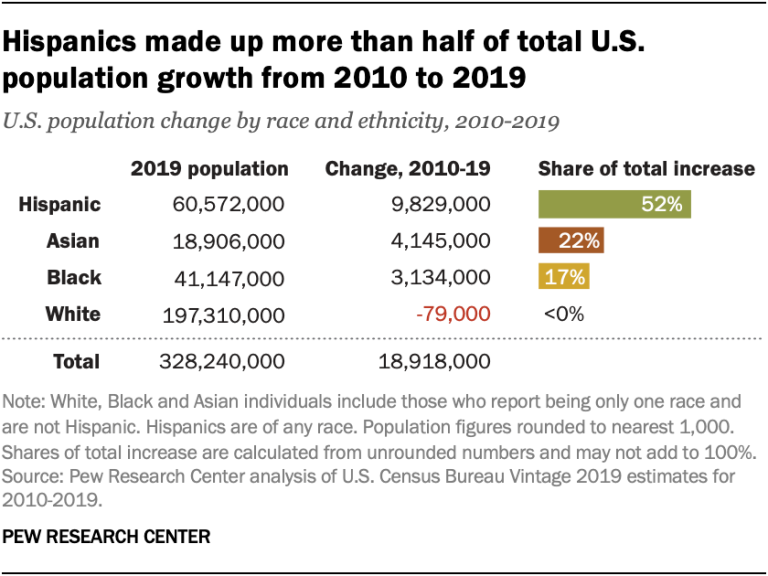
Latinos Driving U.S. Population Growth
“Hispanics have played a significant role in driving U.S. population growth over the past decade, though the group is not growing as quickly as it once did,” Jens Manuel Krogstad reported July 10 for the Pew Research Center.
“From 2010 to 2019, the U.S. population increased by 18.9 million, and Hispanics accounted for more than half (52%) of this growth, according to a Pew Research Center analysis of new U.S. Census Bureau population estimates, the last before 2020 census figures are released.
“In 2019, the number of Hispanics reached a record 60.6 million, making up 18% of the U.S. population. This is up from 50.7 million in 2010, when Hispanics were 16% of the population. The number of Hispanics is growing more slowly than it previously did, due to a decline in the annual number of births to Hispanic women and a drop in immigration, particularly from Mexico. From 2015 to 2019, the Hispanic population grew by an average of 1.9% per year, down significantly from a peak of 4.8% from 1995 to 2000. . . .”

2020 Could Be Banner Year for Native People
“Change has been the operative word in tribal communities of late: The Supreme Court ruled on July 9 that a large swath of eastern Oklahoma remains a Native American reservation based on a treaty signed with the Creek Nation in the 19th Century,” Ethan Sacks wrote Tuesday for NBC News.
“This month, there have also been legal victories for Native environmental activists in their attempts to block two major oil pipelines. Statues of Christopher Columbus, whose arrival in the New World heralded the conquest and mass murder in the eyes of many Indigenous Americans, have been toppled in several states.
“In short, 2020 is shaping up to be a chapter unlike most others in American history books for Native Americans.
“ ‘I see this moment in history as a day of reckoning that Native Americans have known is ahead of us because of what we’ve endured for 20 generations of intergenerational trauma as a result of genocide,’ said Fawn Sharp, president of the National Congress of American Indians, the largest and oldest Native American advocacy organization in the country.
” ‘This is a moment we believe that we’re finally seeing the principles that this country is built upon . . . — equality, racial and social justice,’ added Sharp, who is also president of the Quinault Indian Nation in Taholah, Washington.
“Of all the recent victories, scrapping the Washington team name might be the most high profile. The name, changed from the Braves in 1933 when the team was still in Boston, had an ancient legacy by pro sports standards.
“Many Native American elders, however, have called the nickname a slur as offensive as the N-word . . .”
- Rose Aguilar and Malihe Razazan, KALW-FM, San Francisco: Media Roundtable: How Native & Indigenous Journalists Are Changing The Media Landscape (audio)
- Gillian R. Brassil, Giulia McDonnell Nieto del Rio, Billy Witz and David Waldstein, New York Times: In Campaign Against Racism, Team Names Get New Scrutiny (July 10, updated July 12)
- Jerry Brewer, Washington Post: Future NFL fans will wonder why this name change was so controversial
- Jerry Brewer, Washington Post: Daniel Snyder is detrimental to the welfare of the NFL. He must go.
- Les Carpenter, Washington Post: Most re-brands take months. Washington’s NFL team only has a couple of weeks. (July 14)
- Les Carpenter, Washington Post: Five takeaways from Washington Post’s Redskins story on alleged sexual harassment
- Jonodev O. Chaudhuri, Washington Post: Our Muscogee people suffered for generations in the hope of a better tomorrow. It’s finally here. (July 14)
- Aliyah Chavez and Kolby KickingWoman, Indian Country Today: Washington NFL team kicks out R-word (July 12)
- Henry Cordes, Omaha World Herald: Mutual of Omaha removes Native American chief from its logo
- Kunal Dey, meaww.com: WaPo editor slammed for saying Texas Rangers name ‘must go’ due to racist past, critics say ‘let’s ban sports’
- Evan Grant, Dallas Morning News: Texas Rangers have no immediate plans to change team name despite public scrutiny (June 19)
- Christina Leza, Yes magazine: What Is the U.S.-Mexico Border to Indigenous Peoples Who Have Lived There? (July 7)
- Brian MacQuarrie, Boston Globe: In time of racial reckoning, Founding Fathers increasingly viewed through modern lens
- Robert McCartney, Washington Post: Corporate money, Black Lives Matter protests and elites’ opinion drove Redskins name change (July 12)
- Courtland Milloy, Washington Post: Suzan Harjo fought for decades to remove the Redskins name. She’ll wait to celebrate.
- National Association of Black Journalists: NABJ Sports TASK FORCE RESPONDS to the Washington Post – Redskins story
- National Congress of American Indians: NCAI Statement on the Washington Football Team’s Retirement of Racist Mascot
- Julian Brave NoiseCat, The Undefeated: It’s time to stop using Native team names and mascots, period
- Phil Thompson, Chicago Tribune: Can you compromise on the Chicago Blackhawks nickname? I went through a similar crisis of conscience with Washington’s NFL team.
2 Black Women to Help Reshape Publishing
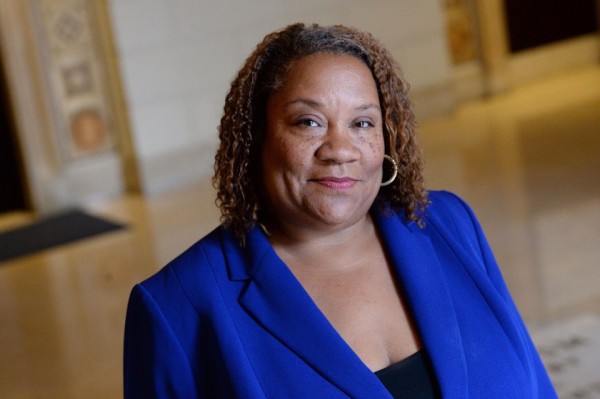 Dana Canedy (pictured), the former New York Times journalist who two weeks ago was appointed publisher of Simon & Schuster, becoming the first Black woman to head a major publishing house, says, “I want to influence the entire publishing community. . . .
Dana Canedy (pictured), the former New York Times journalist who two weeks ago was appointed publisher of Simon & Schuster, becoming the first Black woman to head a major publishing house, says, “I want to influence the entire publishing community. . . .
“I’m one person in one company,” Canedy, administrator of the Pulitzer Prizes, said Tuesday on the “PBS NewsHour,” discussing racial disparities. “But I think that there are some opportunities for leaders across publishing houses to put our heads together and figure out how we can influence this issue, how we can improve things related to both subject matter, pay equity for advances, the voices and the authors that get highlighted. . . .”
 Within days of Canedy’s historic appointment, a second Black woman, Lisa Lucas (pictured), executive director of the National Book Foundation, was named senior v-p and publisher of Pantheon and Schocken Books, Calvin Reid reported Wednesday for Publishers Weekly.
Within days of Canedy’s historic appointment, a second Black woman, Lisa Lucas (pictured), executive director of the National Book Foundation, was named senior v-p and publisher of Pantheon and Schocken Books, Calvin Reid reported Wednesday for Publishers Weekly.
Lucas is the first person of color to head the foundation, which oversees the annual National Book Awards and a variety of national reading programs.
“Asked whether her new role should be seen as a localized outgrowth of a national crisis, Lucas told PW, ‘this is not a cynical hire,’ and that she wouldn’t have taken the job if it was.
“ ‘It’s important to be hired for the job you think you can do and what people think you can do. You don’t want to be a symbol, you want to do the work,’ Lucas told PW. At the same time, she emphasized, ‘you also want to believe that change is possible, and that people are listening and hearing. It will take more than hiring me to shape an equitable book culture. But Black Lives Matter was an everyday concept at the National Book Foundation, it’s where you put your energy every day. I want to see diversity in thought and that takes a diverse set of people.’ . . .”
- Alexandra Alter and Elizabeth A. Harris, New York Times: In Publishing, ‘Everything Is Up for Change’
Neo-Nazi Admits Targeting Journalists
“A man described by authorities as a leader of the neo-Nazi group Atomwaffen Division admitted in federal court in Alexandria, Va., on Tuesday that he harassed minorities and journalists by calling police to their homes and offices,” Rachel Weiner reported Tuesday for the Washington Post.
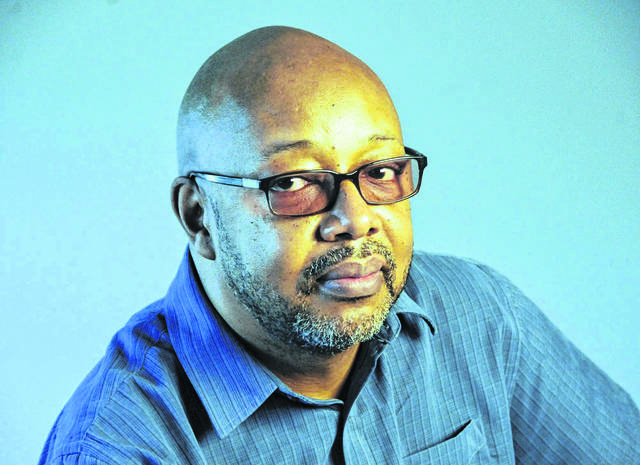 “John Cameron Denton, 26, of Montgomery, Tex., while pleading guilty to a charge of conspiracy to make interstate threats, agreed with a federal judge that he had ‘expressed white supremacist views’ and was “motivated by racial animus.” He admitted in a statement of facts that he targeted a reporter for ProPublica ‘because they exposed his real identity and participation in Atomwaffen Division.’ ”
“John Cameron Denton, 26, of Montgomery, Tex., while pleading guilty to a charge of conspiracy to make interstate threats, agreed with a federal judge that he had ‘expressed white supremacist views’ and was “motivated by racial animus.” He admitted in a statement of facts that he targeted a reporter for ProPublica ‘because they exposed his real identity and participation in Atomwaffen Division.’ ”
Investigative Reporters and Editors last month awarded its Don Bolles Medal to Pitts, Thompson and investigative journalists Chris Ingalls and Jeremy Jojola. The medal “recognizes investigative journalists who have exhibited extraordinary courage in standing up against intimidation or efforts to suppress the truth about matters of public importance.”
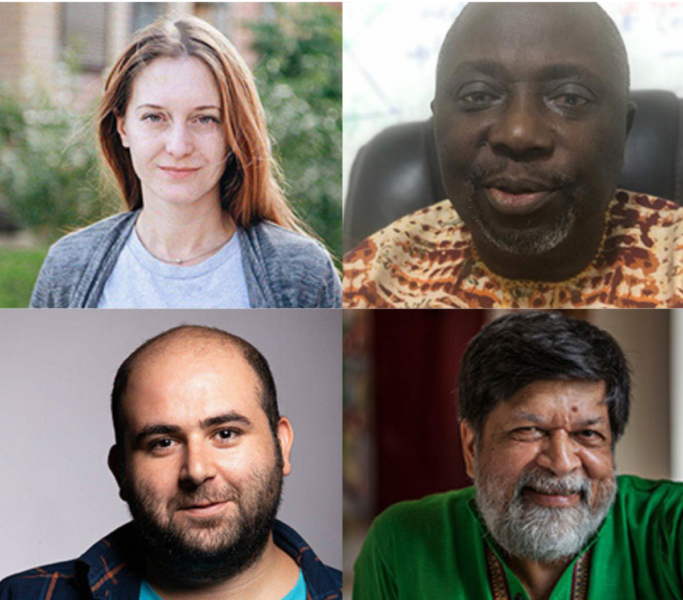
4 Win International Press Freedom Awards
“The Committee to Protect Journalists will honor four courageous journalists from Bangladesh, Iran, Nigeria, and Russia with the 2020 International Press Freedom Awards,” the press freedom organization announced July 13. “All four have been arrested or faced criminal prosecution in reprisal for their reporting. CPJ will also honor lawyer Amal Clooney with the Gwen Ifill Award.”
The awardees are photojournalist and commentator Shahidul Alam of Bangladesh, who spent 102 days behind bars, and said he was beaten in custody; Mohammad Mosaed of Iran, forced to resign from a reformist newspaper under government pressure; Dapo Olorunyomi, co-founder, CEO and publisher of the Nigerian newspaper Premium Times; and Svetlana Prokopyeva of Russia, a regional correspondent for Radio Free Europe/Radio Liberty who was accused of “justifying terrorism,” convicted and ordered to pay a fine of 500,000 rubles (US$6,980).
<h2>Short Takes</h2>
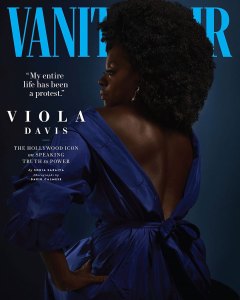
Short Takes
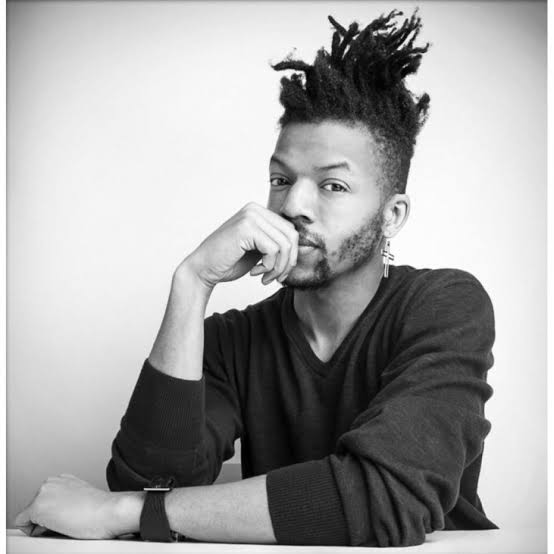 “Until about two weeks ago, Dario Calmese (pictured) didn’t know he was the first Black photographer to shoot the cover of Vanity Fair,” Jessica Testa reported Tuesday for The New York Times. The subject of the cover is Viola Davis, who, in the same August issue, told interviewer Sonia Saraiya that Black women haven’t traditionally been photographed for the cover of Vanity Fair, either.
“Until about two weeks ago, Dario Calmese (pictured) didn’t know he was the first Black photographer to shoot the cover of Vanity Fair,” Jessica Testa reported Tuesday for The New York Times. The subject of the cover is Viola Davis, who, in the same August issue, told interviewer Sonia Saraiya that Black women haven’t traditionally been photographed for the cover of Vanity Fair, either.
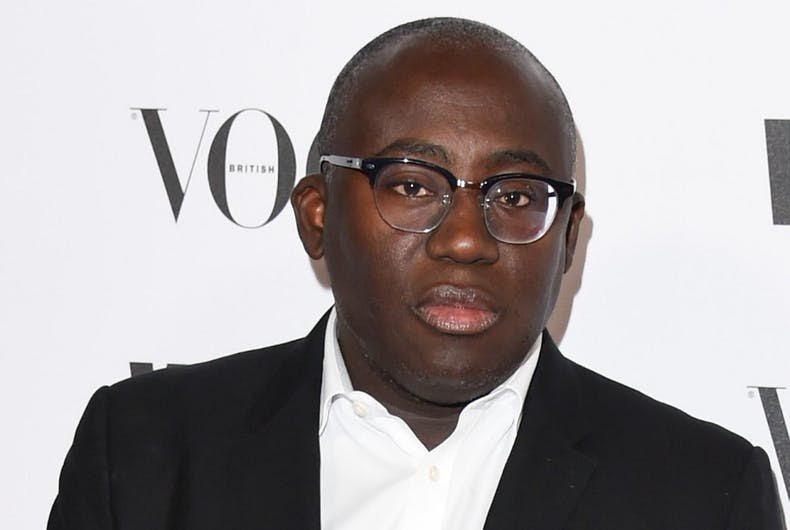 “Edward Enninful (pictured), the editor-in-chief of British Vogue, says that he was ‘racially profiled’ by a security guard at his job who told him to use ‘the loading bay,’ “ Alex Bollinger reported Thursday for lgbtqnation.com.
“Edward Enninful (pictured), the editor-in-chief of British Vogue, says that he was ‘racially profiled’ by a security guard at his job who told him to use ‘the loading bay,’ “ Alex Bollinger reported Thursday for lgbtqnation.com.
- “Fans of once-in-a-lifetime gymnast Simone Biles are over the moon that Biles is on the cover of the August issue of Vogue — but as for the actual photo, not so much,” Mary Papenfuss wrote July 11 for HuffPost. “Several critics on Twitter (including New York Times national picture editor Morrigan McCarthy) took shots at the dimly lit images of Biles inside and out by famous photog Annie Leibovitz — and suggested that Vogue should have used a Black photographer (and hire more Black photographers in general), or at the very least find someone who better understands Black skin tones. . . .”
- “Rachel Scott has been promoted to ABC News White House correspondent and D.C. correspondent,” Ted Johnson reported Monday for Deadline. “Scott has covered the Democratic primary this year and President Donald Trump’s reelection efforts, and did a sit-down with Sen. Bernie Sanders (I-VT) and Rep. Alexandria Ocasio-Cortez (D-NY) during her trip to Iowa before the caucuses. She’s also covered every Trump rally this cycle, including the Tulsa event. . . .”
- “After having reported on the virus during its calamitous sweep through New York City, I knew that the warm, close-knit family culture I had grown up with in the [Rio Grande] Valley would make social distancing a challenge — and as I called ahead to prepare for my return home, I quickly learned that my worst fears were coming true,” Edgar Sandoval reported Tuesday for the New York Times. “Seemingly overnight, people’s aunts, uncles, grandmas and cousins were falling victim, one by one, to the highly contagious virus. . . .”
- Political analyst Jason Johnson, placed on hiatus by MSNBC in March after comments about Vermont Sen. Bernie Sanders’ campaign for the Democratic presidential nomination, returned to the air last week.
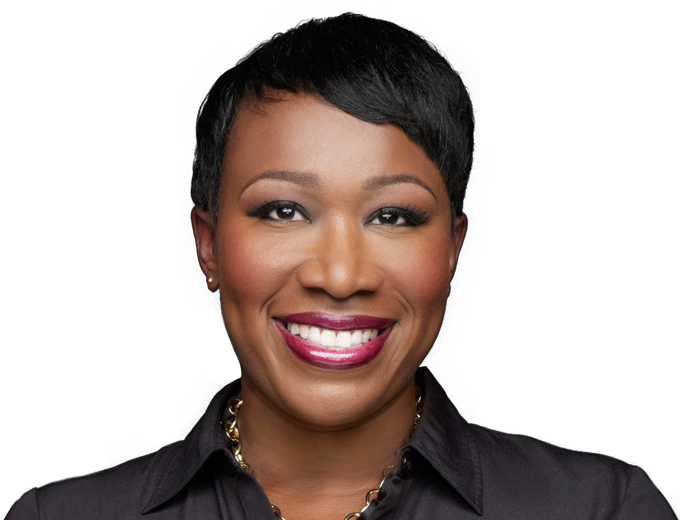 When Joy Reid (pictured) premieres “The ReidOut” Monday at 7 p.m. ET on MSNBC, she will be joined by Hillary Rodham Clinton; Mayor Keisha Lance Bottoms of Atlanta; Chicago Mayor Lori Lightfoot ; former Attorney General Loretta Lynch and MSNBC host Lawrence O’Donnell, MSNBC announced Sunday.
When Joy Reid (pictured) premieres “The ReidOut” Monday at 7 p.m. ET on MSNBC, she will be joined by Hillary Rodham Clinton; Mayor Keisha Lance Bottoms of Atlanta; Chicago Mayor Lori Lightfoot ; former Attorney General Loretta Lynch and MSNBC host Lawrence O’Donnell, MSNBC announced Sunday.
- “MSNBC’s Joy Reid . . . is on the losing end of a big appellate decision that will shape the rules of many cases involving free speech,” Eriq Gardner wrote Wednesday for the Hollywood Reporter. “On Wednesday, the Second Circuit Court of Appeals revived libel claims from a Trump supporter named Roslyn La Liberte. In doing so, the federal appellate circuit decided that special laws enacted by states like California to protect First Amendment activity don’t apply in federal court. . . .”
- Higher Ground, the production studio of Barack and Michelle Obama, plans to launch “The Michelle Obama Podcast” on July 29, with an initial guest lineup that includes Conan O’Brien, Valerie Jarrett and Michele Norris — along with the former first lady’s mother, Marian Robinson, and her brother, Craig Robinson, Nicholas Quah reported Thursday for Vulture.
- “The Los Angeles Times has placed Arash Markazi on paid leave as the newspaper investigates potential ethical lapses by the sports columnist, VICE News has learned,” Maxwell Strachan and Laura Wagner reported Thursday for Vice News. “The investigation formally began last week after members of the newspaper’s sports department sent a letter to leadership stating that they were ‘angry and embarrassed about the repeated ethical breaches’ by Markazi, which they claimed included ‘plagiarism, misrepresenting how his information for stories is obtained, and using his social media accounts to work as a de facto PR representative.’ . . .”
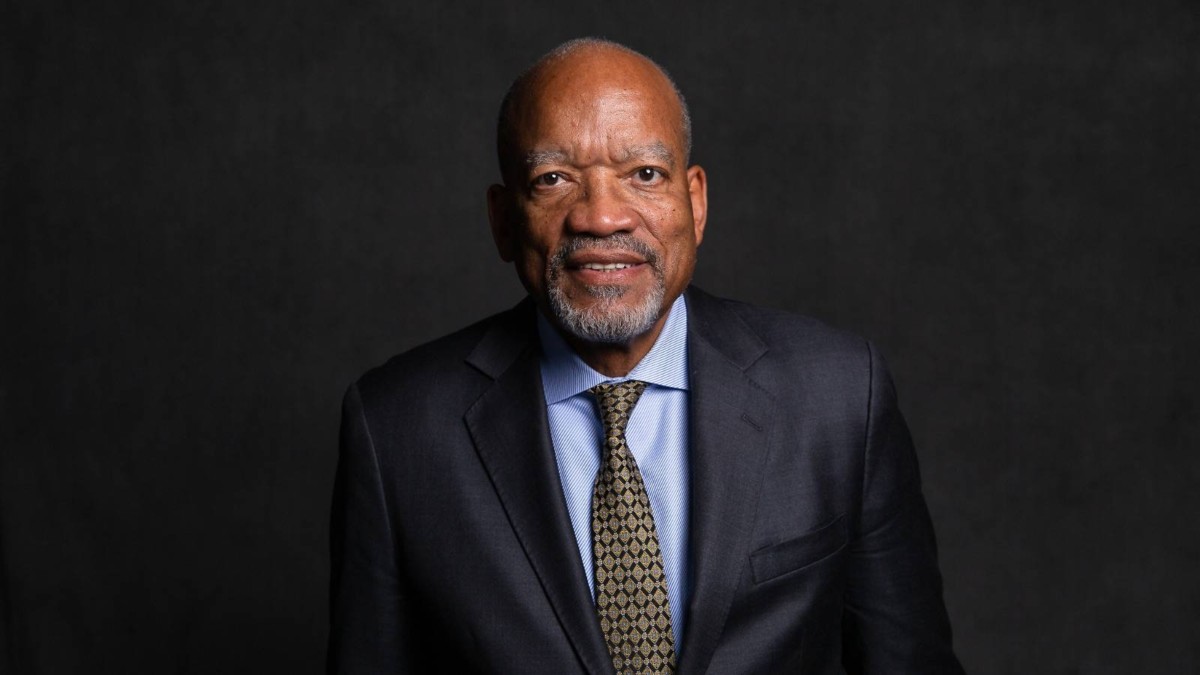 , Charles T. Moses, (pictured), a former reporter for Newsday and the old Times-Union in Rochester, N.Y., has been appointed dean of the School of Management at the University of San Francisco. He had been interim dean.
, Charles T. Moses, (pictured), a former reporter for Newsday and the old Times-Union in Rochester, N.Y., has been appointed dean of the School of Management at the University of San Francisco. He had been interim dean.
- Writing in The Atlantic, Hannah Giorgis has pushed back against a letter to Harper’s magazine signed by 153 figures who condemned the rise of a culture characterized by an intolerance of opposing views. Giorgis wrote July 13, “In recent years, defenses of ‘free speech’ have often been wielded by people in positions of power in response to critics who want to hold them accountable for the real-life harm their words might cause. Many of these public figures frame any such consequences for their ideas as ‘cancel culture,’ a phrase both hazy and incendiary that is broadly applied and often used defensively, the way someone might describe an article they don’t like as ‘clickbait,’ simply to dismiss it. . . .”
- On Wednesday at 11 p.m. Eastern and Pacific time, BET is airing “American Injustice: The Fight for Police Reform,” hosted by Soledad O’Brien. The special is to feature interviews with House Speaker Nancy Pelosi, Democratic Reps. Karen Bass of California, Cedric Richmond of Louisiana and Ayanna Pressley of Massachusetts, all of the Congressional Black Caucus; Minnesota Attorney General Keith Ellison; Black Lives Matter co-founder Patrisse Cullors and CBS News correspondent Jeff Pegues, among others.
- ” ‘CBS This Morning’ co-host Gayle King has officially signed on to satellite radio provider SiriusXM for a topical listener call-in show,” Steven Battaglio reported Wednesday for the Los Angeles Times. “She was offered the regular weekly time slot after launching ‘Gayle King in the House’ in April as a six-week guest program. . . .”
 “Veteran journalist and news leader Ryan ‘R.L.’ Nave (pictured) has joined Reckon as its top editor where he will lead editorial strategy for the brand and oversee its multi-platform digital expansion to serve millennials and Gen-Xers who live in the Deep South,” the publication announced Wednesday. “Nave was editor-in-chief of Mississippi Today from May 2018 to April 2020. . . .”
“Veteran journalist and news leader Ryan ‘R.L.’ Nave (pictured) has joined Reckon as its top editor where he will lead editorial strategy for the brand and oversee its multi-platform digital expansion to serve millennials and Gen-Xers who live in the Deep South,” the publication announced Wednesday. “Nave was editor-in-chief of Mississippi Today from May 2018 to April 2020. . . .”
- “The effect of racism and racial trauma on mental health is real and cannot be ignored,” said CEO Daniel H. Gillison, Jr. of the National Alliance on Mental Illness, quoted July 13 by Boston Globe columnist Jeneé Osterheldt. Osterheldt wrote, “The disparity in access to mental health care in communities of color cannot be ignored. The inequality and lack of cultural competency in mental health treatment cannot be ignored. For Black youth, the suicide rates are rising. . . . “
 In Egypt, journalist Mohamed Mounir (pictured) died July 15 after contracting Covid-19 in jail, where he had spent a month after his June 15 arrest, the International Federation of Journalists reported. “65-year-old Mounir was arrested for ‘spreading fake news’ during his reporting for Al Jazeera, which the Egyptian authorities have banned for allegedly hosting ‘enemies’ of the country,” IFJ said.
In Egypt, journalist Mohamed Mounir (pictured) died July 15 after contracting Covid-19 in jail, where he had spent a month after his June 15 arrest, the International Federation of Journalists reported. “65-year-old Mounir was arrested for ‘spreading fake news’ during his reporting for Al Jazeera, which the Egyptian authorities have banned for allegedly hosting ‘enemies’ of the country,” IFJ said.
- “Honduran journalist David Romero Ellner died yesterday around 7 a.m. of respiratory failure after contracting COVID-19 while imprisoned at the Támara National Penitentiary, according to [the] newspaper La Prensa, the Committee to Protect Journalists reported Sunday. Romero ”should have never been imprisoned for his reporting,” said CPJ Central and South America Program Coordinator Natalie Southwick in New York. ‘As CPJ has warned for months, authorities who continue to imprison journalists in unsafe conditions in the midst of a global pandemic are effectively allowing these convictions to become a death sentence’ .’ . . .”
Journal-isms Fund Drive Continues

“As a veteran reporter, I turn to Richard Prince’s Journal-isms all the time for the latest information on people of color in our business. There is no spin, no slant, just the facts to keep us informed. I also appreciate that he holds journalists and media companies accountable . . . . Keep up the good work. #NoSpinAllowed” (Courtesy Rebecca Aguilar)
— Rebecca Aguilar, freelance reporter; diversity committee chair, Society of Professional Journalists; former vice president, National Association of Hispanic Journalists.
Support Journal-ismsFacebook users: “Like” “Richard Prince’s Journal-isms” on Facebook.
Follow Richard Prince on Twitter @princeeditor
Richard Prince’s Journal-isms originates from Washington. It began in print before most of us knew what the internet was, and it would like to be referred to as a “column.” Any views expressed in the column are those of the person or organization quoted and not those of any other entity. Send tips, comments and concerns to Richard Prince at journal-isms-owner@yahoogroups.com
View previous columns (after Feb. 13, 2016).
- Diversity’s Greatest Hits, 2018 (Jan. 4, 2019)
- Book Notes: Is Taking a Knee Really All That? (Dec. 20, 2018)
- Book Notes: Challenging ’45’ and Proudly Telling the Story (Dec. 18, 2018)
- Book Notes: Get Down With the Legends! (Dec. 11, 2018)
- Journalist Richard Prince w/Joe Madison (Sirius XM, April 18, 2018) (podcast)
- Richard Prince (journalist) (Wikipedia entry)
- February 2018 Podcast: Richard “Dick” Prince on the need for newsroom diversity (Gabriel Greschler, Student Press Law Center, Feb. 26, 2018)
- Diversity’s Greatest Hits, 2017 — Where Will They Take Us in the Year Ahead?
- Book Notes: Best Sellers, Uncovered Treasures, Overlooked History (Dec. 19, 2017)
- An advocate for diversity in the media is still pressing for representation, (Courtland Milloy, Washington Post, Nov. 28, 2017)
- Morgan Global Journalism Review: Journal-isms Journeys On (Aug. 31, 2017)
- Diversity’s Greatest Hits, 2016
- Book Notes: 16 Writers Dish About ‘Chelle,’ the First Lady
- Book Notes: From Coretta to Barack, and in Search of the Godfather
- Journal-isms’ Richard Prince Wants Your Ideas (FishbowlDC, Feb. 26, 2016)
- “JOURNAL-ISMS” IS LATEST TO BEAR BRUNT OF INDUSTRY’S ECONOMIC WOES (Feb. 19, 2016)
- Richard Prince with Charlayne Hunter-Gault,“PBS NewsHour,” “What stagnant diversity means for America’s newsrooms” (Dec. 15, 2015)
- Book Notes: Journalists Follow Their Passions
- Book Notes: Journalists Who Rocked Their World
- Book Notes: Hands Up! Read This!
- Book Notes: New Cosby Bio Looks Like a Best-Seller
- Journo-diversity advocate turns attention to Ezra Klein project (Erik Wemple, Washington Post, March 5, 2014)

